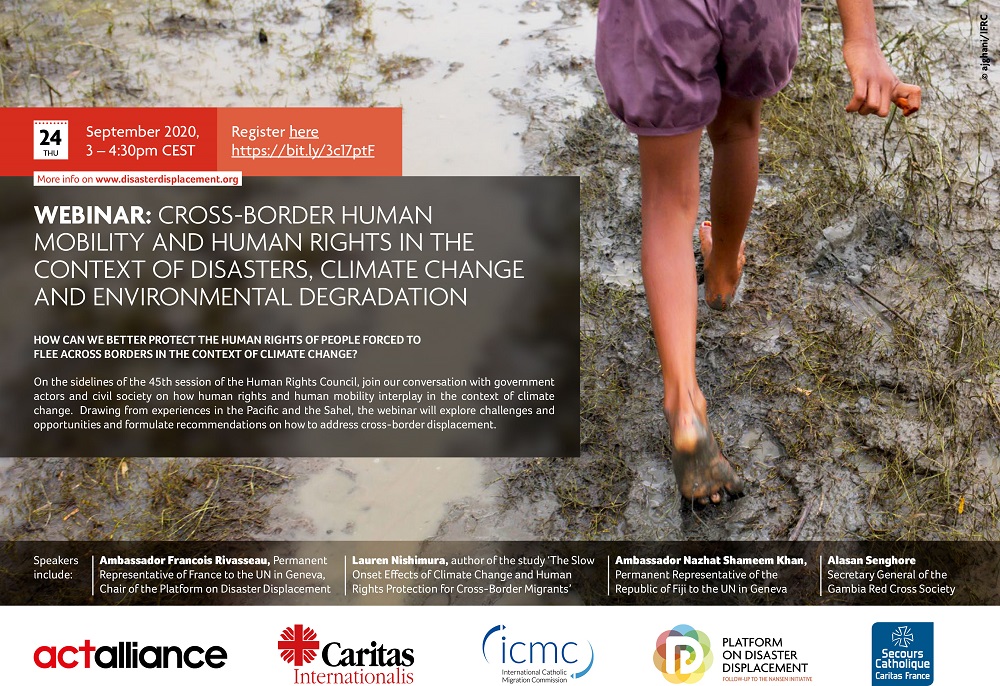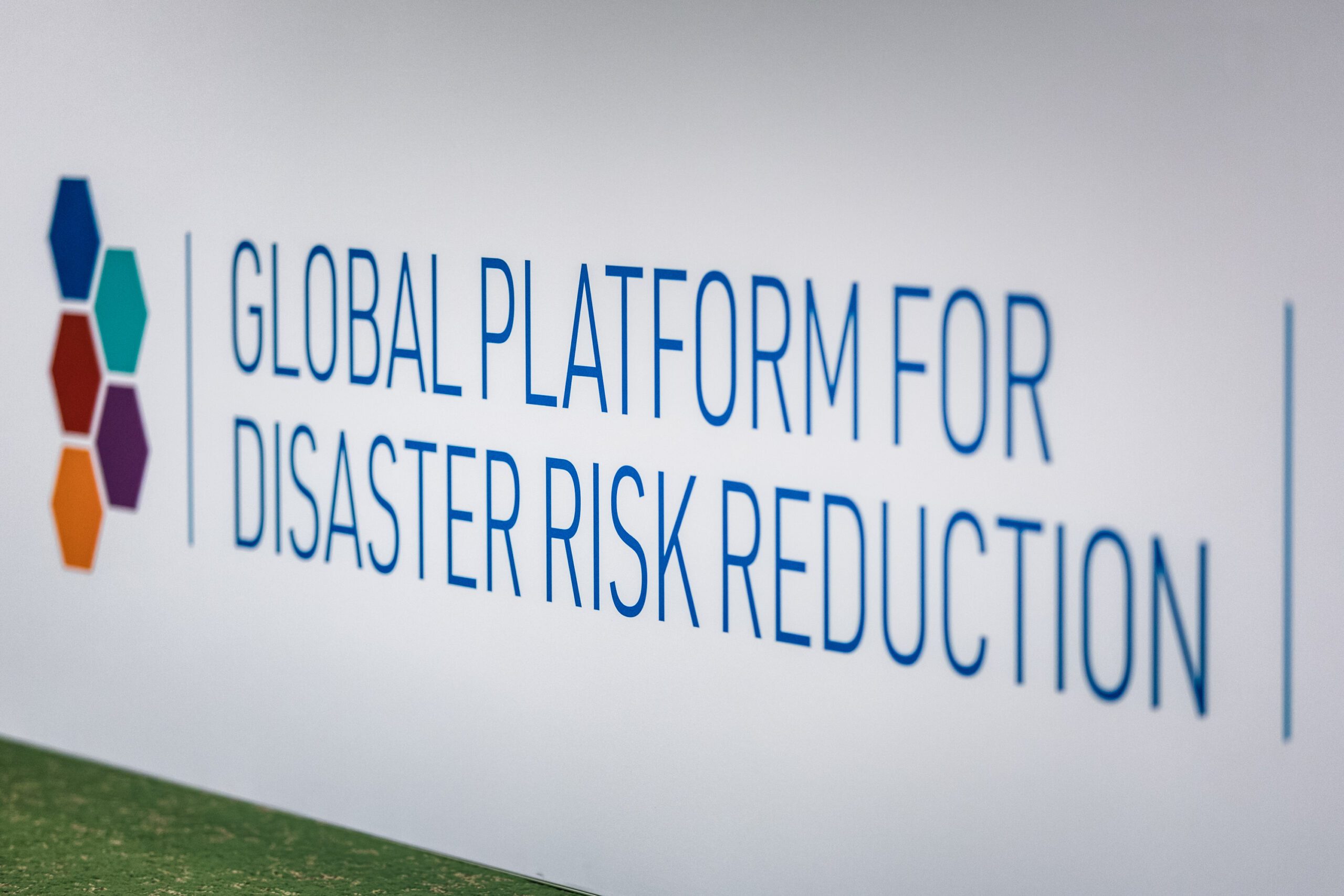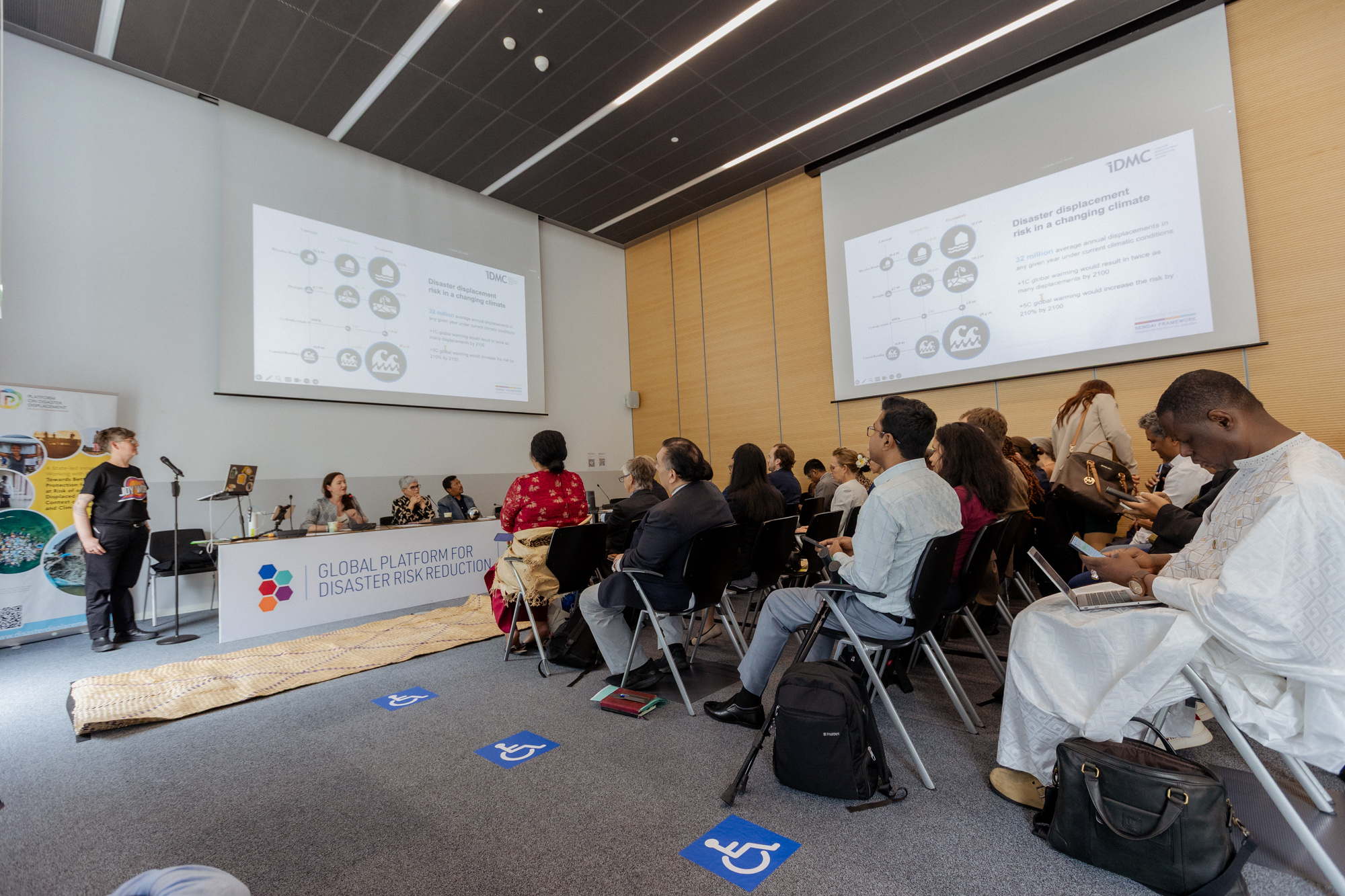Webinar | Cross-border Human Mobility and Human Rights in the Context of Disasters, Climate Change and Environmental Degradation

Webinar: Cross-border human mobility and human rights in the context of disasters, climate change and environmental degradation
in the context of the 45th Regular Session of the Human Rights Council
Thursday 24 September 2020, 3-4.30 pm CEST
Register here: https://zoom.us/webinar/register/WN_9IhzcJI2T3CF51pb4xWPBA
- Background
Disasters, climate change and environmental degradation have impacts on human mobility, requiring an international response based on human rights. Both sudden- and slow-onset events and processes, such as droughts, floods, rising sea levels, land degradation and storms, cause millions of people to leave their homes every year, moving either within their own country or abroad. Even if the consequences of environmental degradation on human mobility are difficult to isolate, as other drivers of migration such as economic, social and political conditions and processes are interlinked, there is consistent evidence showing that environmental changes exacerbate existing vulnerabilities, affect human livelihoods and living conditions, and act as a push factor.
Recent years have seen increased international cooperation seeking to strengthen responses to human rights threats associated with human mobility in the context of climate change. The Sustainable Development Goals put up an overall umbrella for action. The Sendai Framework on Disaster Risk Reduction seeks to reduce risks associated with disasters, including displacement. The Paris Agreement recognizes the importance of taking into account States’ human rights obligations and the rights of migrants in addressing climate change, and the United Nations Framework Convention on Climate Change (UNFCCC) Warsaw International Mechanism on Loss & Damage’s Task Force on Displacement has been mandated to further strengthen cooperation to avert, minimize and address displacement related to the adverse impacts of climate change. Since 2018, the Global Compacts on Refugees (GCR) and for Migration (GCM) have been new tools in bridging these policy areas. While the GCR acknowledges climate as a factor in displacement, the GCM in particular endeavors to promote a comprehensive and holistic approach to migration and finding solutions for all people compelled to move by the adverse impacts of climate change and other environmental factors, and ensuring effective protection of their human rights.
Each of these agreements is being implemented through different processes – all of which have been affected by the COVID-19 pandemic this year. For instance, most of the UNFCCC-related meetings and events have been postponed to 2021. Nevertheless, States, institutional actors, and civil society have remained active on this issue, even if programme implementation has been severely hampered, and face-to-face consultations have been curtailed due to the pandemic. The international Organization for Migration (IOM) and the UN Refugee Agency (UNHCR) are each developing their own respective organizational strategies for addressing climate and displacement/migration; the first Global Refugee Forum has produced the Clean Energy Challenge; and the UN Network on Migration is expected to produce various pieces of guidance for States and other stakeholders to promote the implementation of the GCM on a variety of topics, among them the issue of pathways for migration and enhancing the protection of migrants in situations of vulnerability, including those brought on by climate change. The State-led Platform on Disaster Displacement works with governments and other stakeholders to strengthen protection for disaster displaced persons and coordinate action and support, including at the regional level in the Pacific, the Americas, and East and West Africa. In all these regions, some States have begun addressing this issue in their own national context, which may give new impetus for policy discussions at the regional and global level.
At this point in time, this webinar aims to provide a space to discuss the issue of slow-onset disasters and to review recent developments in the area of climate change, human rights and cross-border human mobility. It aims to provide recommendations to key institutions and processes as they move forward towards a human rights-based approach to providing protection to those displaced under these circumstances. These will draw on inputs from technical experts, as well as experiences from civil society and States.
- Objectives
Building on the outcomes of the Human Rights Council (HRC) panel discussion on human rights, climate change, migrants and persons displaced across international borders (October 2017)[1], the Office of the High Commissioner for Human Rights (OHCHR) expert meeting and study on the slow-onset effects of climate change and human rights protection for cross-border migrants[2], the High Commissioner’s report on human rights, migration and climate change (A/HRC/38/21)[3] as well as the GCM[4], the event has set the following objectives:
- Continue the conversation on the interplay between human rights in the context of climate change and cross-border human mobility by sharing analyses and evidence from different regions;
- Take stock and promote legal and political recommendations to address the protection gaps for cross-border migrants and displaced persons in the context of slow-onset disasters and the adverse effects of climate change;
- Explore opportunities and address critical issues regarding the implementation of safe and regular pathways for migration as called for by the Global Compact for Migration (especially, its Objectives 2, 5 and 7).
- Outputs
A report will be circulated after the event, highlighting recommendations and main ideas for policy improvements. A recording of the webinar will be made available on this space.
- Background documents:
Human Rights Council resolutions on human rights and climate change:
- Human Rights Council resolution 35/20 of 22 June 2017;
- Human Rights Council resolution 32/33 of 1 July 2016;
- Human Rights Council resolution 29/15 of 2 July 2015:
- Human Rights Council resolution 26/27 of 27 June 2014;
- Human Rights Council resolution 18/22 of 30 September 2011;
- Human Rights Council resolution 10/4 of 25 March 2009;
- Human Rights Council resolution 7/23 of 28 March 2008
OHCHR/GMG Principles and Guidelines on the Human Rights Protections of Migrants in Vulnerable Situations
Nansen Initiative Protection Agenda
PDD-OHCHR Study on Slow Onset Effects of Climate Change and Human Rights Protection for Cross-Border Migrants
Secours Catholique – Caritas France Environmental migration. Analysis and positioning paper
Further information on the Human Rights Council
- Programme
| 15:00 – 15:15 |
Opening Remarks
Representative of France, Chair of the Platform on Disaster Displacement
Welcome and Objectives
|
| 15:15 – 15:45 |
Panel presentations on slow-onset events and cross-border human mobility
Lauren Nishimura, author of the study ‘The Slow Onset Effects of Climate Change and Human Rights Protection for Cross-Border Migrants’ Ambassador Nazhat Shameem Khan, Permanent Representative of the Republic of Fiji to the United Nations in Geneva Alasan Senghore, Secretary General of the Gambia Red Cross Society
Guiding Questions
|
| 15:45 – 16:15 |
Moderated plenary discussion based on questions asked by participants |
| 16:15-16:30 | Closing Remarks |
[1] https://www.ohchr.org/Documents/Issues/ClimateChange/ClimateChangeMigration/A_HRC_37_35.pdf
[2] https://www.ohchr.org/Documents/Issues/ClimateChange/SlowOnset/A_HRC_37_CRP_4.pdf
[3] https://documents-dds-ny.un.org/doc/UNDOC/GEN/G18/116/26/PDF/G1811626.pdf?OpenElement
Useful tools
Learn more about the partners ACT Alliance, Caritas Internationalis, ICMC and Secours Catholique
Download the Concept Note for the event:
 Loading...
Loading...
Download the event flyer in EN:
 Loading...
Loading...
Download the event flyer in FR:
 Loading...
Loading...
Learn more about PDD’s work in our Workplan 2019-2022:
